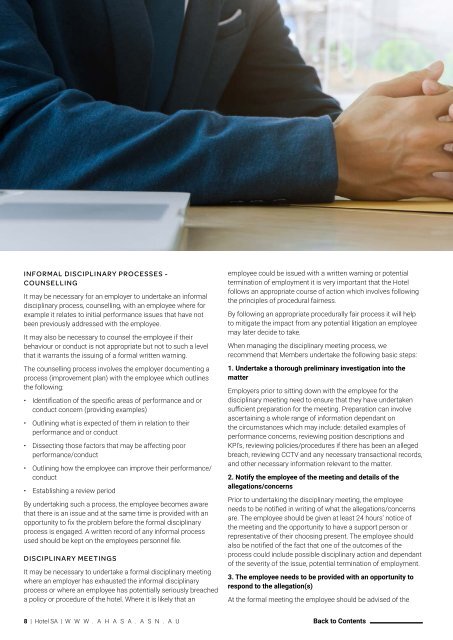HSA November 2020
You also want an ePaper? Increase the reach of your titles
YUMPU automatically turns print PDFs into web optimized ePapers that Google loves.
INFORMAL DISCIPLINARY PROCESSES -<br />
COUNSELLING<br />
It may be necessary for an employer to undertake an informal<br />
disciplinary process, counselling, with an employee where for<br />
example it relates to initial performance issues that have not<br />
been previously addressed with the employee.<br />
It may also be necessary to counsel the employee if their<br />
behaviour or conduct is not appropriate but not to such a level<br />
that it warrants the issuing of a formal written warning.<br />
The counselling process involves the employer documenting a<br />
process (improvement plan) with the employee which outlines<br />
the following:<br />
• Identification of the specific areas of performance and or<br />
conduct concern (providing examples)<br />
• Outlining what is expected of them in relation to their<br />
performance and or conduct<br />
• Dissecting those factors that may be affecting poor<br />
performance/conduct<br />
• Outlining how the employee can improve their performance/<br />
conduct<br />
• Establishing a review period<br />
By undertaking such a process, the employee becomes aware<br />
that there is an issue and at the same time is provided with an<br />
opportunity to fix the problem before the formal disciplinary<br />
process is engaged. A written record of any informal process<br />
used should be kept on the employees personnel file.<br />
DISCIPLINARY MEETINGS<br />
It may be necessary to undertake a formal disciplinary meeting<br />
where an employer has exhausted the informal disciplinary<br />
process or where an employee has potentially seriously breached<br />
a policy or procedure of the hotel. Where it is likely that an<br />
employee could be issued with a written warning or potential<br />
termination of employment it is very important that the Hotel<br />
follows an appropriate course of action which involves following<br />
the principles of procedural fairness.<br />
By following an appropriate procedurally fair process it will help<br />
to mitigate the impact from any potential litigation an employee<br />
may later decide to take.<br />
When managing the disciplinary meeting process, we<br />
recommend that Members undertake the following basic steps:<br />
1. Undertake a thorough preliminary investigation into the<br />
matter<br />
Employers prior to sitting down with the employee for the<br />
disciplinary meeting need to ensure that they have undertaken<br />
sufficient preparation for the meeting. Preparation can involve<br />
ascertaining a whole range of information dependant on<br />
the circumstances which may include: detailed examples of<br />
performance concerns, reviewing position descriptions and<br />
KPI’s, reviewing policies/procedures if there has been an alleged<br />
breach, reviewing CCTV and any necessary transactional records,<br />
and other necessary information relevant to the matter.<br />
2. Notify the employee of the meeting and details of the<br />
allegations/concerns<br />
Prior to undertaking the disciplinary meeting, the employee<br />
needs to be notified in writing of what the allegations/concerns<br />
are. The employee should be given at least 24 hours’ notice of<br />
the meeting and the opportunity to have a support person or<br />
representative of their choosing present. The employee should<br />
also be notified of the fact that one of the outcomes of the<br />
process could include possible disciplinary action and dependant<br />
of the severity of the issue, potential termination of employment.<br />
3. The employee needs to be provided with an opportunity to<br />
respond to the allegation(s)<br />
At the formal meeting the employee should be advised of the<br />
8 | Hotel SA | W W W . A H A S A . A S N . A U Back to Contents


















